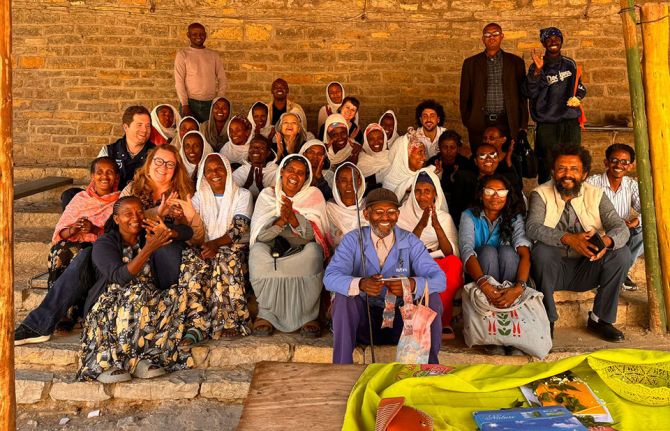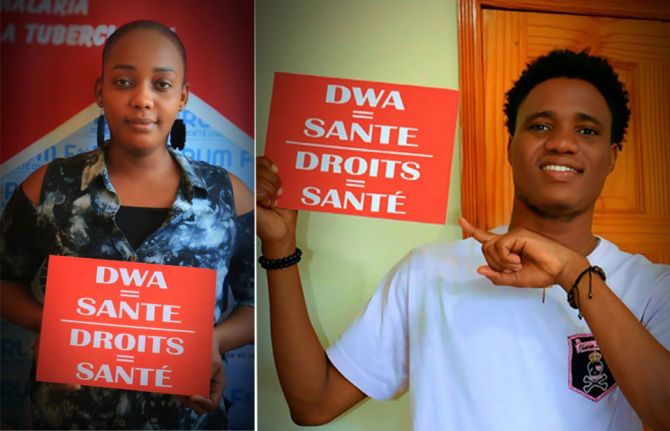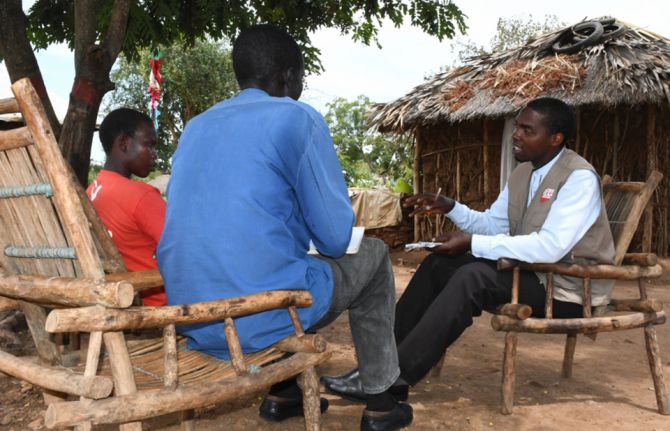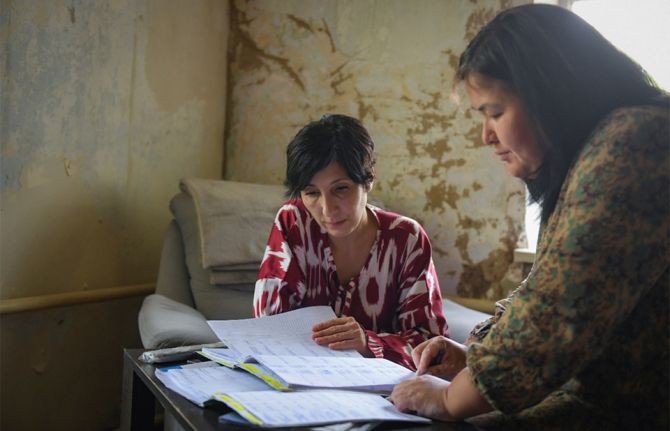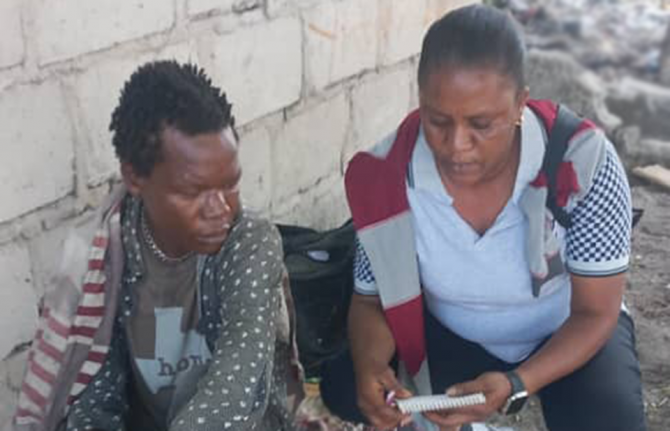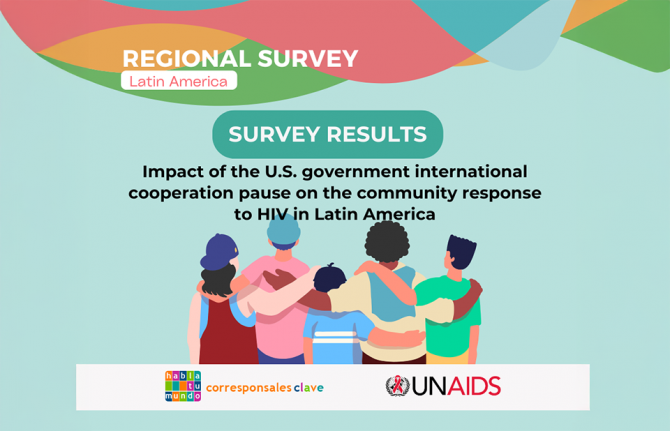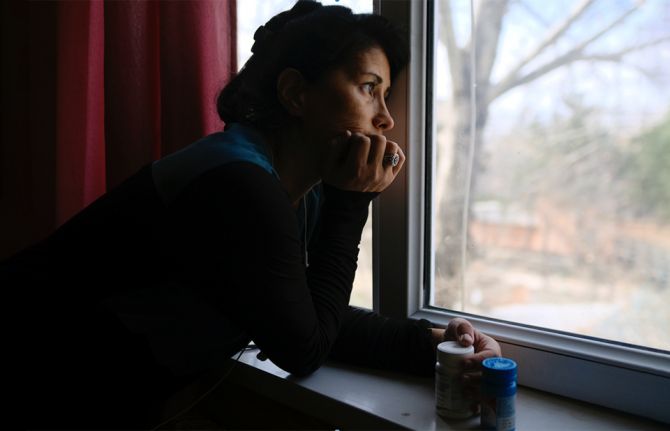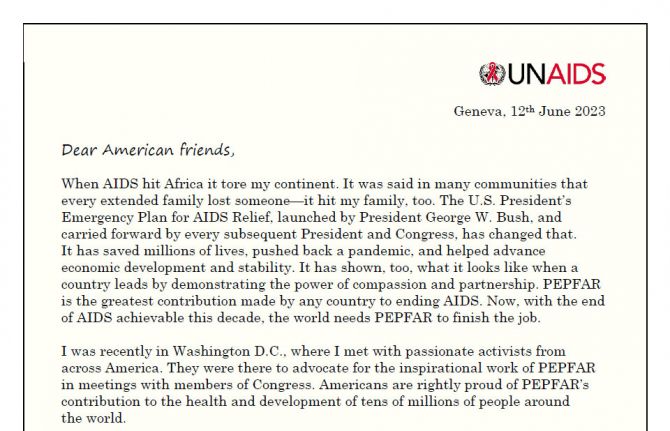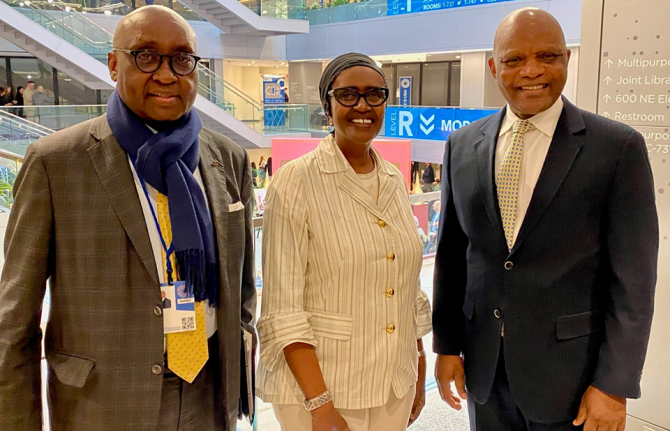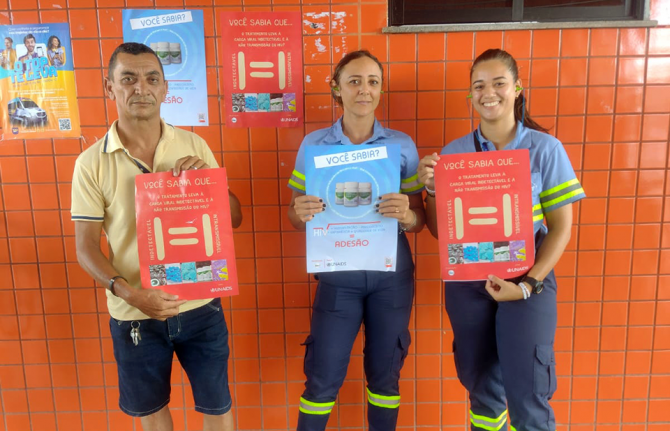
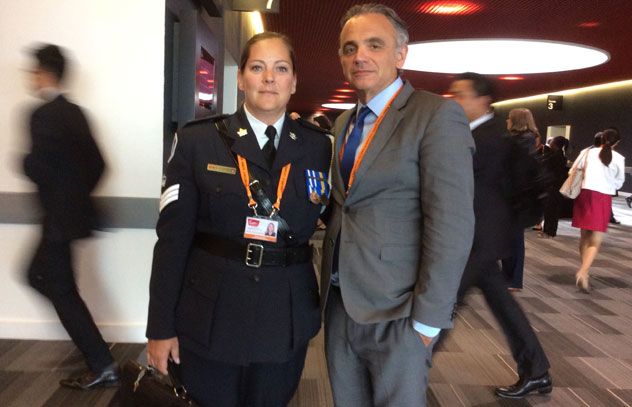
UNAIDS Deputy Executive Director Luiz Loures with with a member of the Canadian delegation who is a peace keeper in Afghanistan.

UNAIDS Deputy Executive Director Luiz Loures with the Archbishop of Canterbury Justin Welby.
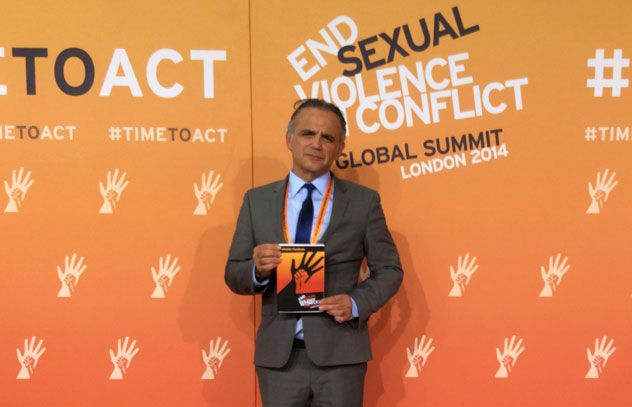
UNAIDS Deputy Executive Director Luiz Loures poses in front of a display panel.
Update
Ending sexual violence in conflict
13 June 2014
13 June 2014 13 June 2014Faith leaders and faith-based organisations have a vital role to play in engaging their communities in both the prevention of, and response to, sexual violence in conflict. That was one of the main outcomes of the ministerial dialogue held as part of the Global Summit to End Sexual Violence in Conflict.
The meeting brought together ministers, senior faith leaders and representatives of faith-based organizations and other nongovernmental organizations to discuss the role of faith leaders and faith-based organizations in tackling sexual violence, to examine how to enhance greater collaboration between faith leaders and governments and other key civil society groups and to identify resources and training for faith leaders to enable them to respond effectively and appropriately to survivors of violence.
Participants agreed that faith communities are often at the centre of communities and able to be first responders in times of crisis. They can challenge the attitudes associated with sexual violence and address perceptions that can lead to inequality and the spread of violence.
“Addressing discrimination in all its forms and manifestations is central to responding to sexual violence in conflict and faith leaders have a central role to play,” said UNAIDS Deputy Executive Director Luiz Loures. “It is intolerable that women and girls suffer from so much violence in conflict and insecure settings. These brutal acts are a violation of human rights, place women at risk and make them vulnerable to HIV,” he added.
UNAIDS is working in conflict settings in South Sudan, Mali, Central African Republic and Democratic Republic of the Congo to secure HIV services and reduce the vulnerabilities of refugees and internally displaced people in conflict, post-conflict and fragile environments, engage the military, police and peacekeepers as agents for change in reducing risks of HIV transmission among civilians and combatants and address sexual and gender-based violence by taking steps to protect vulnerable women and girls and in the event of abuse ensure access to post-exposure prophylaxis.
Global summit
The Global Summit to End Sexual Violence in Conflict, the largest international gathering ever held on this issue, addressed the impact of sexual violence on health, peace and development. The meeting, co-chaired by the United Kingdom’s Foreign Secretary, William Hague, and Special Envoy for the United Nations High Commissioner for Refugees Angelina Jolie, was hosted in London, United Kingdom, from 10 to 13 June and brought together more than 900 experts representing the legal, military, humanitarian and judicial sectors, nongovernmental organizations, sexual violence survivors, faith leaders, and regional and international organizations from across the world to share commitment to end sexual violence, provide support to survivors of sexual violence and find ways to hold perpetrators accountable.
The debate during the summit addressed four key areas, including:
- Accountability, including through increased documentation and investigation.
- Greater support and protection for survivors of sexual violence, including children.
- Ensuring that sexual and gender-based violence responses and the promotion of gender equality are fully integrated in all peace and security efforts, including security and justice sector reform.
- Regional and international strategic cooperation.
An international protocol for dealing with rape and sexual violence in conflict that provides guidelines on the investigation of sex crimes and the collection of evidence for future prosecutions was presented. Participants signed a statement of action and agreed on a range of legal, humanitarian and security sector reforms that will play a critical role in ending the culture of impunity for sexual violence in conflict.
Related

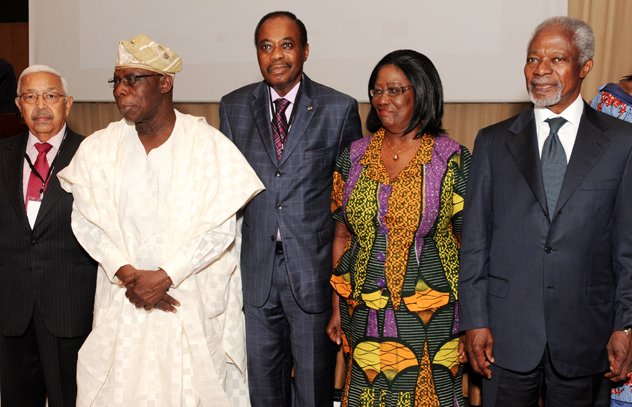
From left to right Pedro Pires Former President of Cabo Verde; Olusegun Obasanjo Chair of the Commission and Former President of Nigeria; Edem Kodjo Former Prime Minister of Togo; Mary Chinery-Hesse member of the African Union Panel of the Wise; Kofi Annan Chair of the Kofi Annan Foundation and former Secretary –General of the United Nations; the lady (half) is Christine Kafando, Founder, Association Espoir pour Demain.
Update
Treating drug use as a public health issue
12 June 2014
12 June 2014 12 June 2014A new report by the West Africa Commission on Drugs (WACD) says that drug trafficking, consumption and production in West Africa is undermining institutions, threatening public health and damaging development efforts. The report, Not Just in Transit: Drugs, the State and Society in West Africa, particularly highlights the importance of addressing drug use in as a public health issue rather than criminalizing people who use drugs.
Not Just in Transit: Drugs, the State and Society in West Africa states that the criminalization of drug use and possession has a range of negative consequences, such as over-burdening already stretched justice systems, exacerbating social problems, increasing human rights violations and encouraging corruption. It also worsens major epidemics such as HIV and Hepatitis C, as people who use drugs often fear accessing the health and harm reduction services they need in case of legal reprisals. This is especially important for people who inject drugs who can be highly vulnerable to HIV through the use of non-sterile equipment.
The report cites data to highlight the extent of the problem in a region where drug consumption is said to be increasing. For example, in Senegal an estimated 9.1% of people who inject drugs are living with HIV, compared to less that 1% of the general population.
As well as treating drug use as a public health issue with socio-economic causes and consequences, the report also advocates for the reform of relevant laws; decriminalization of drug use and low-level, non-violent drug offences; adopting harm reduction approaches and encouraging research, including the gathering of baseline data on trafficking and consumption.
The West Africa Commission on Drugs is convened by former UN Secretary-General Kofi Annan, and chaired by former Nigerian President Olusegun Obasanjo.
Quotes
"We call on West African governments to reform drug laws and policies and decriminalize low-level and non-violent drug offences. The glaring absence of treatment facilities for drug users fuels the spread of diseases and exposes an entire generation, users and non-users alike, to growing public health risks. We must all take hope in the findings of this report."
"Criminalising drug users should be replaced by a public health approach. We have concluded that drug use must be regarded primarily as a public health problem. Drug users need help, not punishment. Therefore we must deal effectively and humanly with this problem by adopting a health oriented approach and civil society must be fully engaged as a partner in this effort."
Related

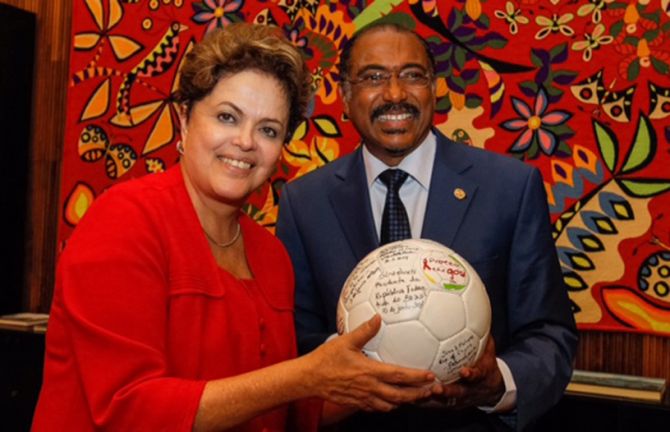
Brazil's President Dilma Rousseff (left) and UNAIDS Executive Director hold the Protect the Goal ball, a campaign aimed to raise global awareness of HIV and encourage young people to commit to HIV prevention.
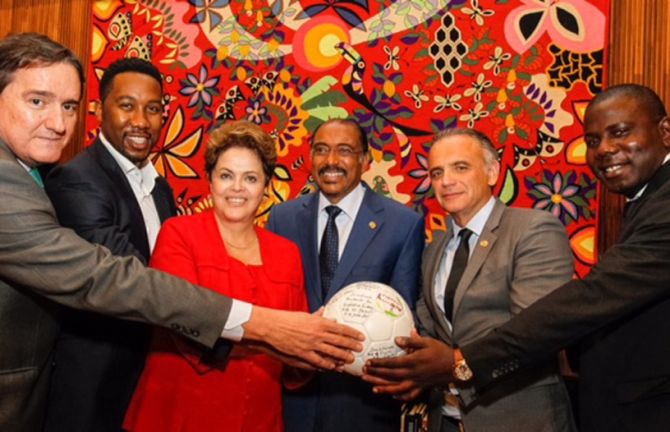
L to R: Vice-Minister of Health, Jarbas Barbosa; Ndaba Mandela; Brazilian President Dilma Rouseff; UNAIDS Executive Director, Michel Sidibé; UNAIDS Deputy Executive Director, Luiz Loures; and Kweku Mandela.
Update
President of Brazil joins the UNAIDS’ Protect the Goal campaign
11 June 2014
11 June 2014 11 June 2014President of Brazil Dilma Rousseff joined on 10 June the UNAIDS’ Protect the Goal campaign to raise global awareness of HIV.
During a meeting with UNAIDS Executive Director, Michel Sidibé, President Rousseff added her signature to the campaign ball in support of the initiative that aims to encourage young people to commit to HIV prevention and to emphasize the need to ensure universal access for all eligible for HIV treatment by 2015.
The campaign was officially launched in Brazil on the eve of the 2014 FIFA World Cup at a special event in the city of Salvador, Bahia on 9 June, with the presence of the Governor of Bahia, the Mayor of Salvador and the Brazilian Health Minister, among others.
Before reaching Brazil, the Protect the Goal ball started a tour from South Africa—the host of the World Cup 2010—through countries that are joining the World Cup competition. Heads of State of Algeria, Argentina, Cameroon, Chile, Colombia, Costa Rica, Ecuador, Ivory Coast, Ghana, Honduras, Nigeria, and Uruguay also signed the ball. The United Nations Secretary-General, Ban Ki-moon, also signed the Protect the Goal football as have many heads of United Nations agencies and the former United Nations Secretary-General Kofi Annan.

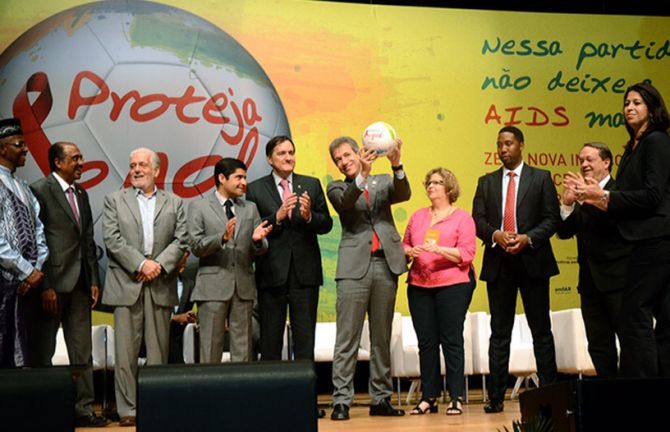
UNAIDS Protect the Goal campaign reached Brazil on the eve of the 2014 FIFA World Cup. The campaign kick-off was announced at a special event, supported by the United Nations Population Fund, the government of the State Bahia, the Salvador City Hall and the Brazilian Health Ministry, held in the emblematic Castro Alves Theatre, in Salvador on 9 June.
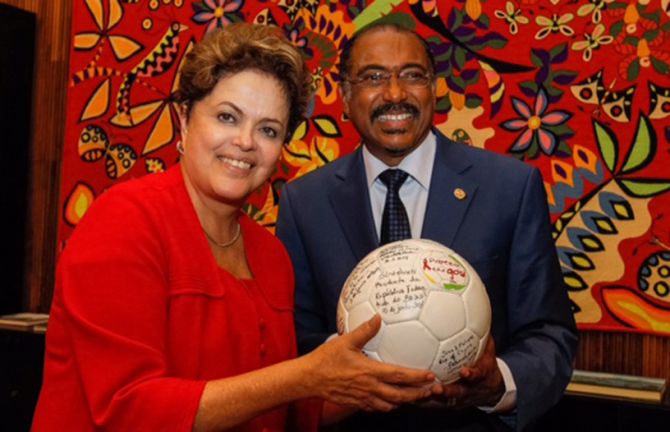
Brazil's President Dilma Rousseff (left) and UNAIDS Executive Director hold the Protect the Goal ball, a campaign aimed to raise global awareness of HIV and encourage young people to commit to HIV prevention.
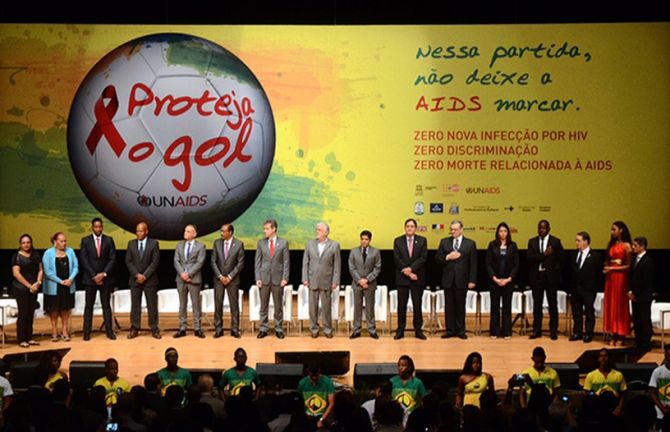
UNAIDS Protect the Goal campaign reached Brazil on the eve of the 2014 FIFA World Cup. The campaign kick-off was announced at a special event, supported by the United Nations Population Fund, the government of the State Bahia, the Salvador City Hall and the Brazilian Health Ministry, held in the emblematic Castro Alves Theatre, in Salvador on 9 June.

UNAIDS Protect the Goal campaign reached Brazil on the eve of the 2014 FIFA World Cup. The campaign kick-off was announced at a special event, supported by the United Nations Population Fund, the government of the State Bahia, the Salvador City Hall and the Brazilian Health Ministry, held in the emblematic Castro Alves Theatre, in Salvador on 9 June.
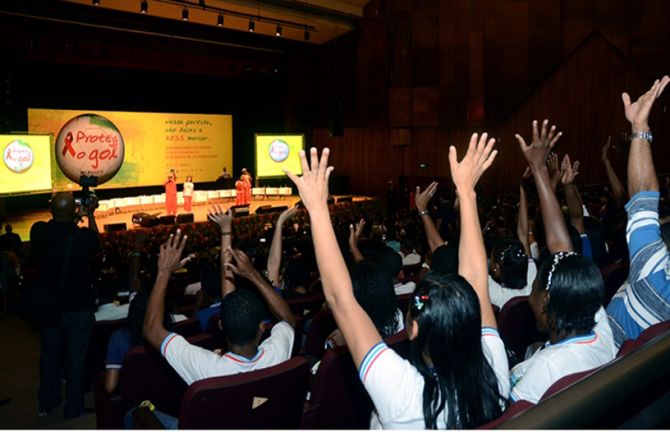
UNAIDS Protect the Goal campaign reached Brazil on the eve of the 2014 FIFA World Cup. The campaign kick-off was announced at a special event, supported by the United Nations Population Fund, the government of the State Bahia, the Salvador City Hall and the Brazilian Health Ministry, held in the emblematic Castro Alves Theatre, in Salvador on 9 June.
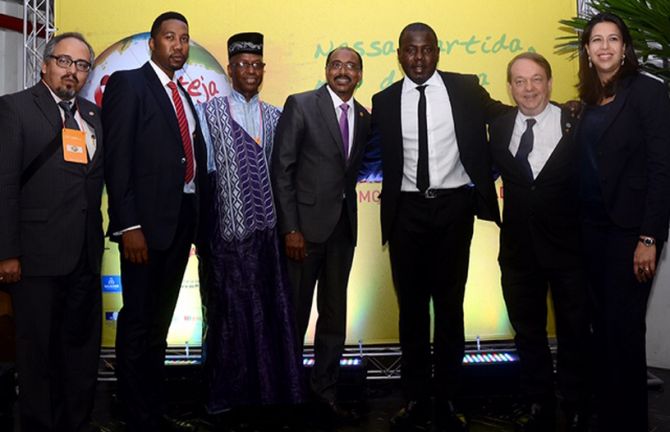
UNAIDS Protect the Goal campaign reached Brazil on the eve of the 2014 FIFA World Cup. The campaign kick-off was announced at a special event, supported by the United Nations Population Fund, the government of the State Bahia, the Salvador City Hall and the Brazilian Health Ministry, held in the emblematic Castro Alves Theatre, in Salvador on 9 June.
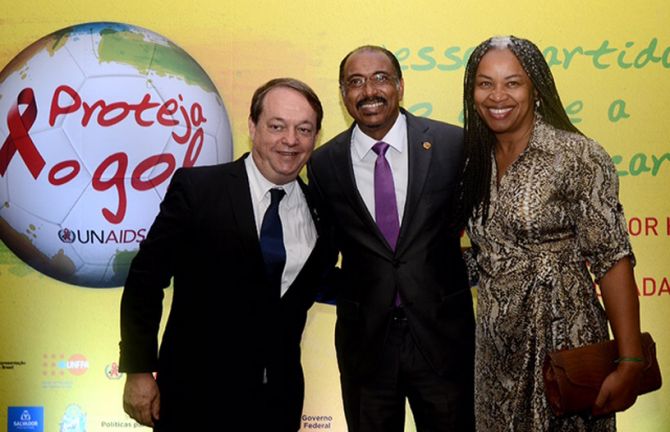
UNAIDS Protect the Goal campaign reached Brazil on the eve of the 2014 FIFA World Cup. The campaign kick-off was announced at a special event, supported by the United Nations Population Fund, the government of the State Bahia, the Salvador City Hall and the Brazilian Health Ministry, held in the emblematic Castro Alves Theatre, in Salvador on 9 June.
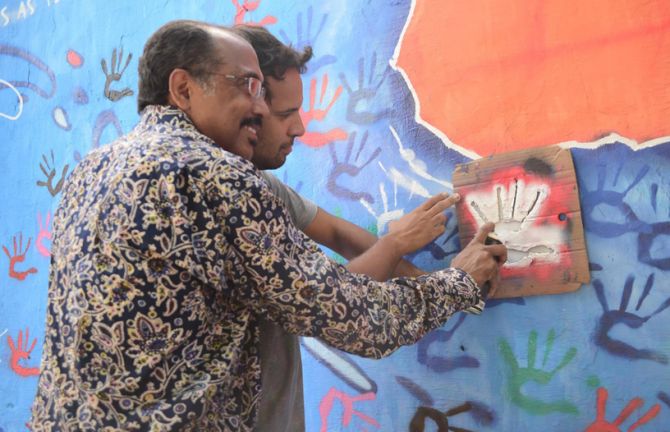
UNAIDS Protect the Goal campaign reached Brazil on the eve of the 2014 FIFA World Cup. The campaign kick-off was announced at a special event, supported by the United Nations Population Fund, the government of the State Bahia, the Salvador City Hall and the Brazilian Health Ministry, held in the emblematic Castro Alves Theatre, in Salvador on 9 June.
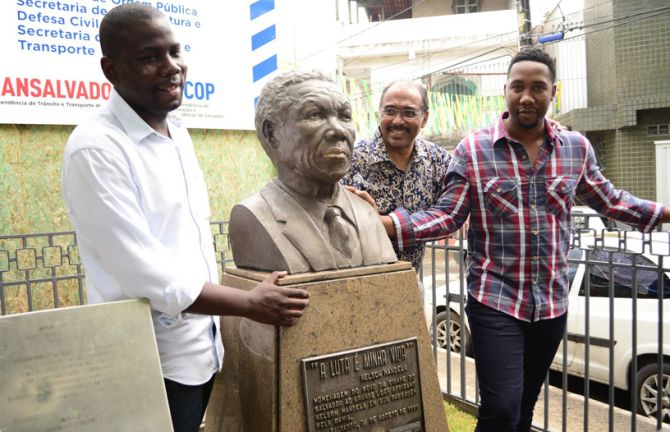
UNAIDS Protect the Goal campaign reached Brazil on the eve of the 2014 FIFA World Cup. The campaign kick-off was announced at a special event, supported by the United Nations Population Fund, the government of the State Bahia, the Salvador City Hall and the Brazilian Health Ministry, held in the emblematic Castro Alves Theatre, in Salvador on 9 June.
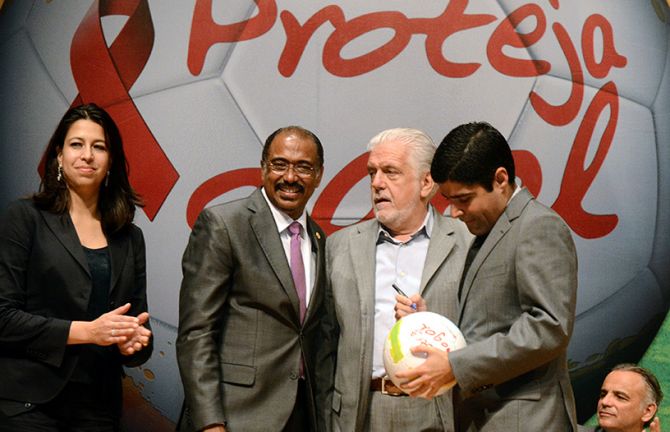
UNAIDS Protect the Goal campaign reached Brazil on the eve of the 2014 FIFA World Cup. The campaign kick-off was announced at a special event, supported by the United Nations Population Fund, the government of the State Bahia, the Salvador City Hall and the Brazilian Health Ministry, held in the emblematic Castro Alves Theatre, in Salvador on 9 June.
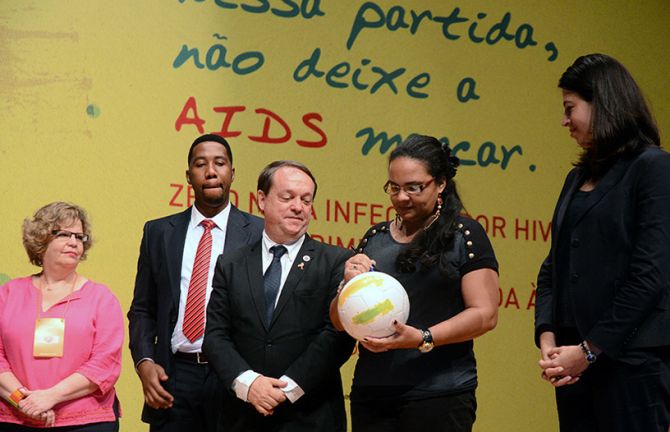
UNAIDS Protect the Goal campaign reached Brazil on the eve of the 2014 FIFA World Cup. The campaign kick-off was announced at a special event, supported by the United Nations Population Fund, the government of the State Bahia, the Salvador City Hall and the Brazilian Health Ministry, held in the emblematic Castro Alves Theatre, in Salvador on 9 June.
Update
UNAIDS Protect the Goal campaign kicks-off in Brazil
10 June 2014
10 June 2014 10 June 2014UNAIDS ‘Protect the Goal’ campaign is a global social movement, mobilizing the power of sport to empower young people to access HIV services
UNAIDS Protect the Goal campaign has been launched in Brazil on the eve of the 2014 FIFA World Cup. The campaign kick-off was announced at a special event on 9 June at the emblematic Castro Alves Theatre in Salvador, Brazil. UNAIDS Executive Director Michel Sidibe was joined by global and local partners, including the Government of the State Bahia, the Salvador City Hall, the Brazilian Health Ministry, the United Nations Population Fund (UNFPA) and the Protect the Goal spokespersons, Ndaba and Kweku Mandela.
As part of the Protect the Goal campaign during the World Cup in Brazil, 2 million condoms and Protect the Goal leaflets are being distributed across the 12 World Cup host cities and free rapid HIV tests will be offered at local Fan Fests. Other cities such as Aracajú, Porto Seguro, Ribeirão Preto, Santos and many more are joining the campaign and schools in the state of Bahia are participating with contests and HIV training programmes.
Protect the Goal was first launched at the 2010 FIFA World Cup in South Africa. To symbolize the strong links between Latin America and Africa, the ‘Protect the Goal World tour’ was launched during the friendly match between South Africa and Brazil in March 2014. The tour saw the passing of the ‘Protect the Goal’ football through the countries participating in the 2014 FIFA World Cup. In recent weeks, the Protect the Goal ball was signed by the Heads of State of Algeria, Argentina, Cameroon, Chile, Colombia, Costa Rica, Ivory Coast, Ghana, Honduras, and Nigeria, and Uruguay. The United Nations Secretary-General, Ban Ki-moon, has signed the Protect the Goal football as have many heads of UN agencies and the former UN Secretary-General Kofi Annan.
The Protect the Goal campaign aims to raise global awareness of HIV, encourage young people to commit to HIV prevention; and to emphasize the need to ensure universal access for all eligible for HIV treatment by 2015, the deadline for the UN Millennium Development Goals.
Quotes
"Protect the Goal is more than just a global HIV awareness campaign. It is a bold social movement, uniting people from around the world with the power of sport and social change. It is an honour to launch the Protect the Goal campaign in Salvador with global partners and our hosts here in Salvador, Brazil."
"This project, carried out in partnership with UNAIDS, is how the Ministry of Health of Brazil is implementing innovative HIV prevention strategies for young people."
"People will be looking at my country, wanting to see great football during the World Cup. This is a great opportunity, so I want to help UNAIDS and be part of the winning team against HIV."

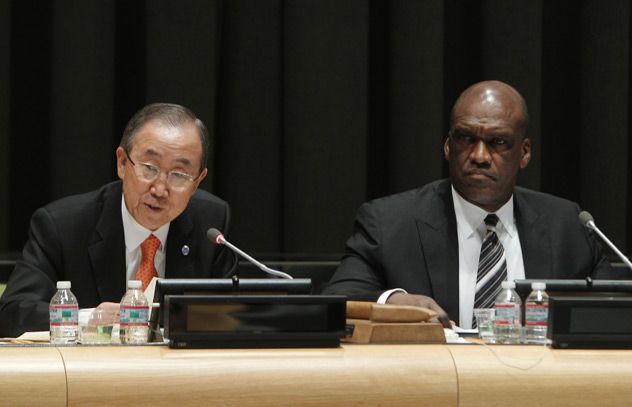
Ban Ki-moon, United Nations Secretary-General and John W. Ashe, President of the 68th Session of the United Nations General Assembly. Credit: UN Photo/Devra Berkowitz
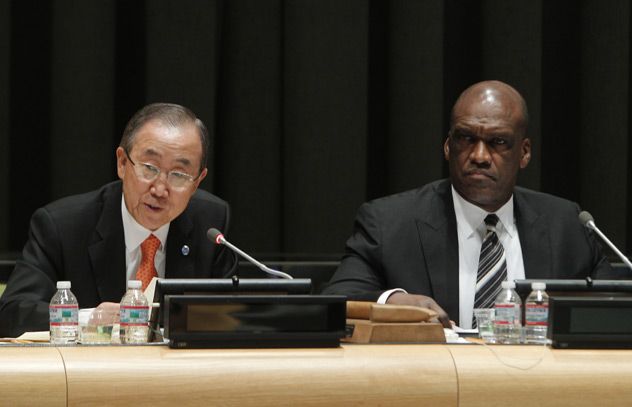
The United Nations Secretary-General Ban Ki-moon presented his report on HIV to the sixty-eighth United Nations General Assembly in New York on 6 June 2014.
Update
United Nations Secretary-General presents progress report on AIDS at the sixty-eighth session of the General Assembly
06 June 2014
06 June 2014 06 June 2014The United Nations Secretary-General Ban Ki-moon presented his report on HIV to the sixty-eighth United Nations General Assembly in New York on 6 June 2014.
The report Towards ending the AIDS epidemic: meeting the 2015 targets and planning for the post-2015 era takes stock of progress made in implementing the targets set out in the 2011 United Nations General Assembly Political Declaration on HIV and AIDS. The report provides an update on developments in the AIDS response and recommends key actions to accelerate progress towards achieving the goals and targets to be met by 2015. The report also urges a commitment to ending the AIDS epidemic as a development priority in the post-2015 development agenda.
UNAIDS Executive Director Michel Sidibé will also participate in an interactive panel discussion on the side-lines of the General Assembly plenary meeting to exchange views on what it will take to end the AIDS epidemic.
*Note: On 30 July a decision was adopted by the General Assembly calling for a High-level meeting on HIV/AIDS in 2016. Read the draft decision submitted by the President of the General Assembly.
Quotes
"I thank Michel Sidibé and UNAIDS for their leadership along with the efforts across the United Nations system and beyond to mobilize the global response [to AIDS].”
“As Member States proceed in their deliberations, I hope they will consider the importance of ending the AIDS epidemic as a priority [post-2015]. The success of the HIV response can also offer useful lessons for addressing other health and development issues.”
"I thank Michel Sidibé and UNAIDS for their leadership along with the efforts across the United Nations system and beyond to mobilize the global response [to AIDS].”
“As Member States proceed in their deliberations, I hope they will consider the importance of ending the AIDS epidemic as a priority [post-2015]. The success of the HIV response can also offer useful lessons for addressing other health and development issues.”

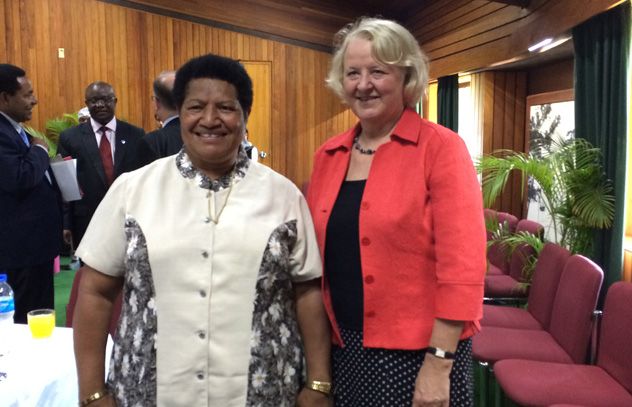
UNAIDS Deputy Executive Director Jan Beagle with Honourable Julie Soso, Governor of Eastern Highlands province and MP Member of Parliamentary Working Group on Population and Sustainable Development.
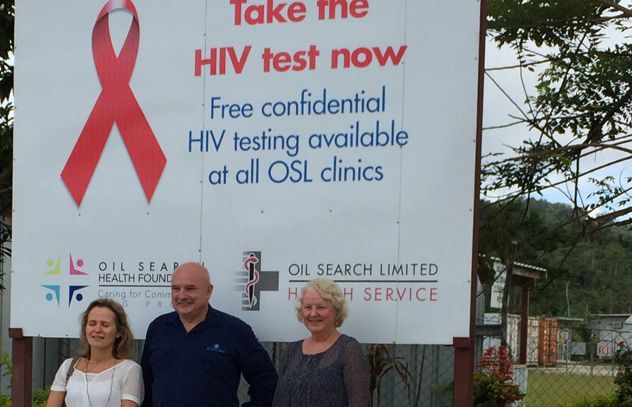
UNAIDS Deputy Executive Director Jan Beagle; with Professor Sharon Lewin, local co-chair of AIDS 2014; and Peter Botten, Managing Director of Oil Search Limited
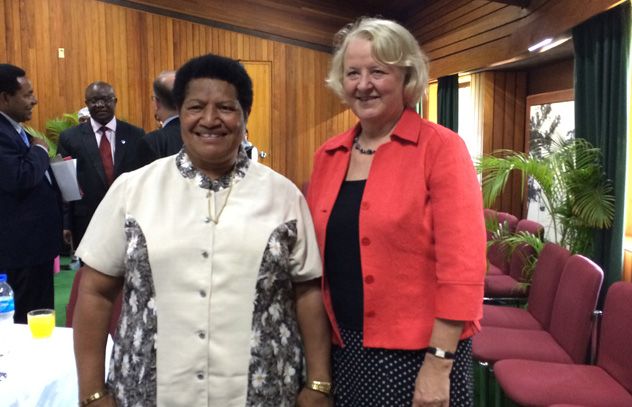
UNAIDS Deputy Executive Director Jan Beagle with Honourable Julie Soso, Governor of Eastern Highlands province and MP Member of Parliamentary Working Group on Population and Sustainable Development.
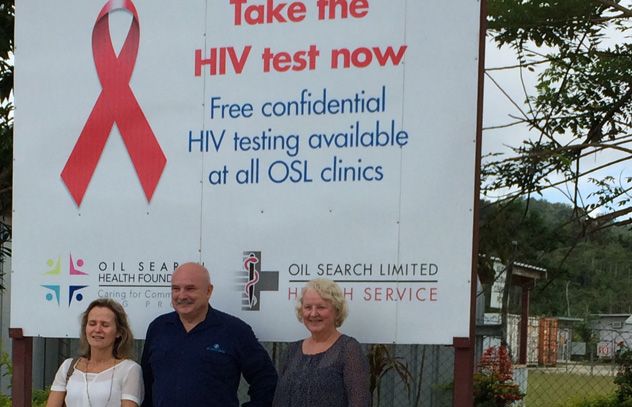
UNAIDS Deputy Executive Director Jan Beagle; with Professor Sharon Lewin, local co-chair of AIDS 2014; and Peter Botten, Managing Director of Oil Search Limited
Update
Papua New Guinea: the centrality of a multisectoral approach to the AIDS response
06 June 2014
06 June 2014 06 June 2014Papua New Guinea has the highest prevalence of HIV in Oceania (0.5% in 2012) and is experiencing an epidemic concentrated in key population groups and in certain geographical locations. During an official visit to the country, UNAIDS Deputy Executive Director Jan Beagle met with a variety of stakeholders—including representatives of the government, parliamentarians, development partners, civil society, the private sector and faith-based organizations—which were opportunities to highlight that one of the strengths of the AIDS movement globally has been its ability to build coalitions of stakeholders across disciplines and sectors. “AIDS is much more than a health issue, it is a development, human rights and gender issue. To get to zero in Papua New Guinea we need the power of a coalition of all sectors to ensure that no one is left behind,” said Ms Beagle during a meeting with members of the parliamentary working groups on HIV and population and sustainable development.
In Hela Province, Ms Beagle saw first hand the work of the Oil Search Health Foundation. The Foundation, in partnership with the government, civil society and communities, is providing HIV-related services and using HIV as an entry point for broader health and development outcomes—an example of a public–private partnership delivering quality services in a cost-effective way in a challenging environment.
Women are vastly underrepresented at all levels of the government (only three women sit in the national parliament), which limits their power to influence public policy at all levels. Violence against women is extremely high, and is experienced by an estimated two thirds of women. UN Women, as part of its Safe Cities Global Initiative, is promoting a safer working environment for women in two pilot marketplaces in the National Capital District of Papua New Guinea—where 80% of market vendors are women—enabling women to keep their earnings safe and to be safer physically. In the markets, infrastructure is being upgraded, market stalls renovated and potable running water made available. New innovative cashless methods for the collection of fees are being implemented to prevent extortion and theft, market vendor associations established and a referral system for survivors of family and sexual violence in the markets piloted. With support from UNAIDS, health mobile clinics will be established in these pilot markets to provide basic health services, including HIV-related services.
Related

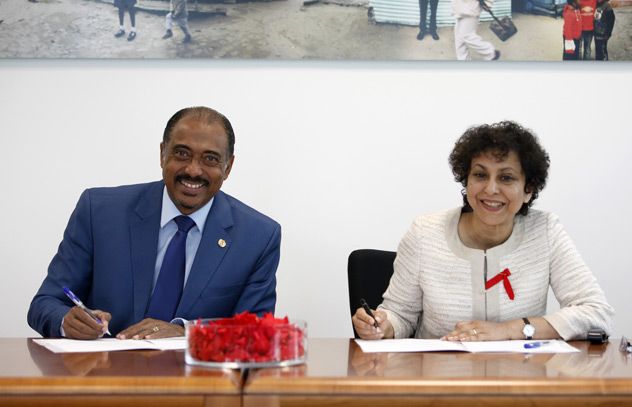
UNAIDS Executive Director, Michel Sidibé and IDLO Director-General, Irene Khan signing the cooperation agreement.
Update
UNAIDS and IDLO agree to scale up joint efforts towards zero discrimination
02 June 2014
02 June 2014 02 June 2014UNAIDS and the International Development Law Organization (IDLO) have signed a cooperation agreement to work together in addressing HIV-related discrimination. Cooperation activities will focus on creating enabling legal environments that support access to health and promote non-discrimination for vulnerable populations living with and affected by HIV.
Activities will include strengthening national legal capacity— within the health and justice sectors, government ministries and civil society organizations—to review punitive laws that obstruct access to HIV prevention, treatment and care services.
Both organizations will also support networks of legal professionals, government representatives and civil society organizations working on issues related to HIV, law, access to justice and human rights. The agreement will facilitate the exchange of experiences and best practices. It will also promote cooperation in research and collaboration on publications on law and policy reform to protect and promote the human rights of people living with and affected by HIV.
Protective laws, adequately resourced and enforced, help broaden access to essential health and social services, enhance the quality and effectiveness of services and protect people living with or vulnerable to HIV from stigma, discrimination and violence.
In 2012, national governments in 60% of countries reported the existence of laws, regulations or policies that present obstacles to effective HIV prevention, treatment, care and support for key populations and vulnerable groups.
Discriminatory laws—and law enforcement—include those that restrict women’s equal access to education, employment, property, credit or divorce; law enforcement that drives sex workers, men who have sex with men and people who use drugs underground and away from HIV services; and overly broad laws on HIV transmission.
Quotes
Working together to ensure a protective legal environment for people most affected by HIV will ensure that everyone can have access to lifesaving HIV prevention and treatment services without fear of discrimination or legal reprisals.
Ending stigma and discrimination are essential to fight HIV. This includes having legal systems that safeguard equality and human rights, judges that do not apply prejudice, empowered citizens, and health services provided without discrimination.
Related

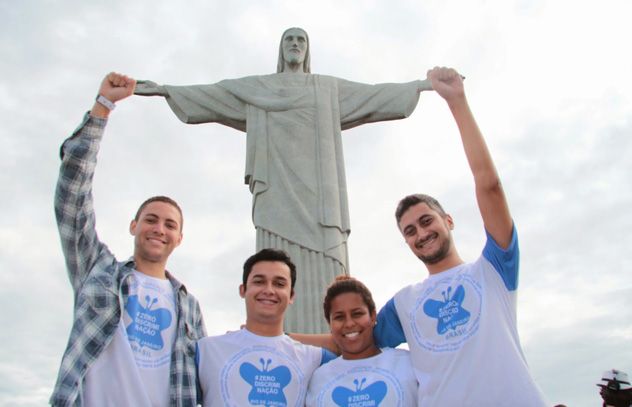
The iconic Brazilian landmark of Christ the Redeemer was the venue for an event hosted on 24 May to promote respect and human rights.

The ceremony was part of the UNAIDS’ Zero Discrimination campaign—which aims to eliminate discrimination that hinders the right to a full, dignified and productive life—and the Archdiocese of Rio de Janeiro’s campaign Somos Todos Iguais which seeks to promote respect for human rights.

Participants at the event to promote a society free from stigma and discrimination.
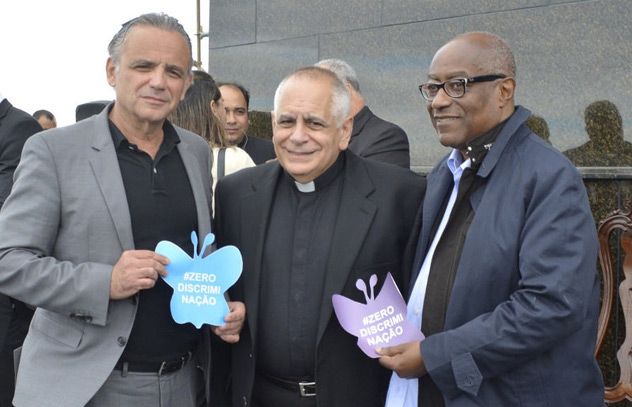
L to R: UNAIDS Deputy Executive Director Luiz Loures, Monsignor Robert Vitillo, from Caritas Internationalis and Márcio Tadeu Ribeiro Francisco coordinator of the Zero Discrimination campaign in Rio de Janeiro.
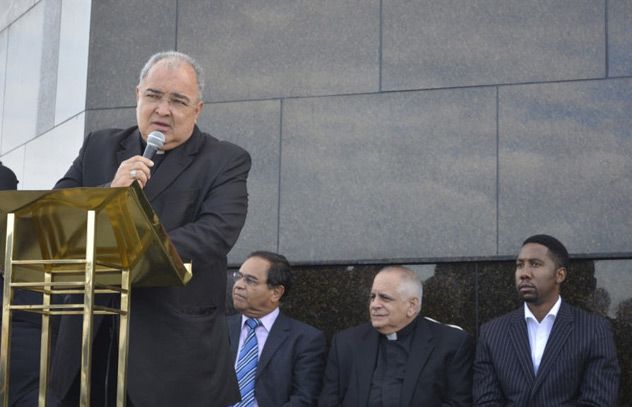
Archbishop of Rio de Janeiro Orani Tempesta.
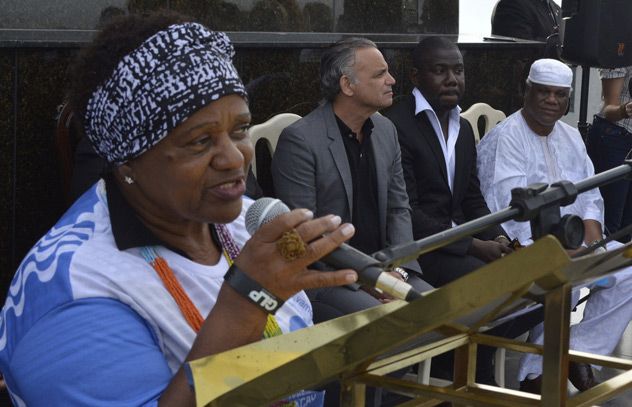
Sônia Regina Gonçalves, representing the communities of Rio de Janeiro.
Update
Brazil: A model against discrimination
30 May 2014
30 May 2014 30 May 2014Note: On 2 June 2014, Brazilian President Dilma Rousseff enacted a new law that prohibits discrimination against people living with HIV. The law provides penalties for anyone who:
- Denies, delays, cancels or prevents the enrolment or retention of a student living with HIV in educational establishments of any level, whether public or privat;
- Denies employment or work; dismisses from office or job; or segregates within the work or school environment based on HIV status;
- Discloses the condition of the person living with HIV; or
- Denies or delays health care.
The iconic Brazilian landmark of Christ the Redeemer was the venue for an event hosted on 24 May to promote respect and human rights. Organized by UNAIDS in a partnership with the Archdiocese of Rio de Janeiro, the event brought together United Nations and government representatives, religious leaders and other partners to call for a society free from stigma.
The ceremony was part of the UNAIDS’ Zero Discrimination campaign—which aims to eliminate discrimination that hinders the right to a full, dignified and productive life—and the Archdiocese of Rio de Janeiro’s campaign Somos Todos Iguais which seeks to promote respect for human rights.
The event was attended by Luis Lourez, UNAIDS Deputy Executive Director; Cardinal Dom Orani Tempesta; Ndaba and Kweku Mandela; Sônia Regina Gonçalves, representing the communities of Rio de Janeiro; Monsignor Robert Vitillo, from Caritas Internationalis; Babalawo Ivanir dos Santos, from Rio’s Commission Against Religious Intolerance; father Omar Raposo, rector of Christ the Redeemer; canon Marcos William Bernardo, episcopal vicar for Social Communication; Adele Benzaken, Deputy Director, STD/AIDS Department, Brazilian Ministry of Health; and civil society representatives.
Quotes
"We have the technology, and we have the knowledge to bring this epidemic to an end. What hinders us today are the prevailing stigma and discrimination."
"The world we desire and want is a world in which people can move around, in which they can come and go without feeling threatened by their way of thinking, by their religion, their ideas, by the disease they may carry; a life in which dignity is present. It is knowledge, brotherhood, the love for your neighbours that make the difference."
"It's important to talk about discrimination not only because Brazil is hosting the World Cup, but also because Brazil reflects much of the world. There are [in Brazil] many people from different cultures, backgrounds, different skin colors. If we can move forward here in Brazil, we can definitely progress around the world."
"The worst kind of discrimination is the lack of respect for others, and Pope Francis has asked us to use social networks and the media to talk about loving our neighbours."
Related

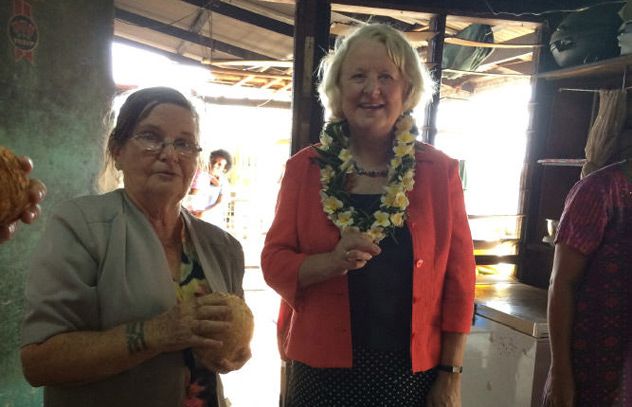
UNAIDS Deputy Executive Director Jan Beagle with former Minister for Community Development, and renowned AIDS activist, Dame Carol Kidu.

UNAIDS Deputy Executive Director Jan Beagle visited the Pari community during her official visit to Papua New Guinea.
Update
Papua New Guinea: communities at the centre of the AIDS response
29 May 2014
29 May 2014 29 May 2014The communities most affected by HIV have always been at the forefront of the response to the epidemic, mobilizing and inspiring others to act. In her official visit to Papua New Guinea, taking place during the last week of May, UNAIDS Deputy Executive Director Jan Beagle witnessed how community leadership is making a difference for people living with HIV in the country.
Community systems in the country are based on the traditional wantok welfare and care system, whch is grounded on the belief that if one of your wantoks (close friends) is sick, you need to care for him or her. This system has allowed communities to be more responsive in delivering HIV services to those most in need in an effective, rights-based and culturally appropriate manner.
During a visit to the Pari community with former Minister for Community Development, and renowned AIDS activist, Dame Carol Kidu, Ms Beagle highlighted the importance of community leadership in demonstrating acceptance of people living with HIV, raising awareness about HIV prevention and tackling stigma and discrimination.
Quotes
"We need to maximize the participation of people living with HIV; their involvement gives personal power and immediacy to AIDS efforts, improves the technical elements and relevance of programmes, enables buy-in by the broader people living with HIV constituency and the community in general and inspires others into action."
"Zero discrimination is the hardest zero to reach. We need role models, chiefs, councillors, women; we need everyone to have the courage to reject stigma, discrimination and violence, to create a supportive community environment for people living with HIV, and for open discussions at the family and community level on HIV and sexual education issues."
"Women are caregivers in our communities so they need to understand the needs of people living with HIV. Knowledge about HIV needs to go to every household in our villages. We know people are dying from AIDS but we do not talk about it."
Related

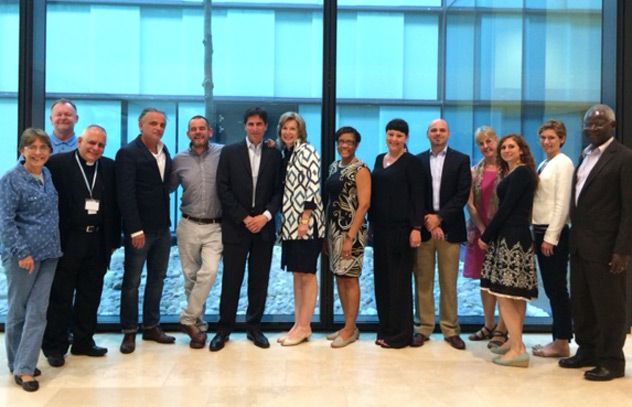
On the side-lines of the sixty-seventh World Health Assembly, UNAIDS convened a meeting between European-based members of civil society with Ambassador Deborah Birx, the new United States Global AIDS Coordinator.
Update
United States Global AIDS Coordinator presents PEPFAR’s vision to civil society
23 May 2014
23 May 2014 23 May 2014On the side-lines of the sixty-seventh World Health Assembly, UNAIDS convened a meeting between European-based members of civil society with Ambassador Deborah Birx, the new United States Global AIDS Coordinator.
Ambassador Birx presented her vision for PEPFAR, including a focus on impact, accountability and transparency. She also emphasized the essential role of civil society in helping achieve an AIDS-free generation. "From the earliest days of the AIDS epidemic to the present, in communities and countries around the world, civil society has been at the very heart of an effective and accountable response. Moving forward, civil society's role remains as vital as ever."
Participants discussed a variety of issues including the need to invest in community capacity development and grass roots advocacy work, the impact that policies against lesbian, gay, bisexual and transgender people have on service delivery and how to address this trend, drug pricing concerns, and the importance of working with faith based providers more directly. The group also discussed the value of using viral load as a measure of program success as well as opportunities to work together to intensify the global response to AIDS.
UNAIDS Deputy Executive Director Luiz Loures acknowledged this was Ambassador Birx's first meeting with civil society outside of the United States in her new role, and pledged continued collaboration. "UNAIDS is committed to working closely with PEPFAR to advance the response to AIDS. Ambassador Birx and I share a common commitment to ensure multiple stakeholders, including civil society, are meaningfully involved in that response."

